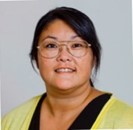Four inspiring speakers gave presentations, each with their own perspective on generative AI
 |
Michael E. Caspersen This presentation contains many references to where you can watch, hear and read more about generative AI development and application. |
 |
Mushtaq Bilal Mushtaq Bilal has created this tutorial: Become an Efficient Academic Writer with AI Apps. He posts on X(Twitter )about using AI for academic writing and has many Twitter followers. This presentation provides advice for the lecturer and researcher who wants to use AI apps for academic writing. Presentation: 'AI Stormøde - Anvendelse og udvikling af generativ AI i praksis' by Mushtaq Bilal |
 |
Janni Lee B. Bang Brodersen This presentation outlines the security challenges posed by generative AI and the considerations everyone should take into account when using generative AI. Presentation: 'AI stormøde - Generativ AI og GDPR' by Janni Lee Bang
|
 |
Jesper Hedegaard Vesterbæk This presentation describes the existing rules and shows examples of how generative AI has been used for cheating and what lecturers should be aware of. |
58 participants from 5 faculties and Central Administration attended the symposium workshop, which was based on these four perspectives and in which the task was to discuss and make recommendations for specific products that support the use of generative AI in teaching and education at SDU – products that support academic environments and the individual lecturer in managing the use of and building knowledge about generative AI.
Vision
What impact will the use of generative AI have on the labour market, and what does it mean for the skills students will need to have when they leave SDU after graduating? What skills and abilities should SDU educate students in that cannot be replaced by AI? How can AI help evolve the way we conduct teaching and assessment?
Understanding technology and society
In light of generative AI, what ethical considerations and critical thinking approaches should be included in teaching to support the educational aspect that SDU stands for? How can we at SDU merge the approach to AI with the spread of technological understanding in education so that SDU addresses the development and needs of society?
Application and development of AI in practice
How will we guide and support students in the use and development of AI? What requirements does this place on us when we create course descriptions and programme descriptions? How do we ensure quality in AI-inclusive education, and how do we structure the work, regardless of the type of study programme? What tools are available, how do you stay up-to-date and where can you find inspiration for embedding AI in your teaching?
Law
What are the legal aspects of GDPR, copyright, legislation and internal rules in the education area that can be communicated to the organisation as common guidelines and general points of attention? What rules can be developed in the future regarding exams and the use of generative AI, both in terms of organisation and assessment, and how should the rules be enforced?
Next step
As from 6 September, the Council for Education has considered the summary and recommendations from the symposium, and working groups will be set up to look at programme regulations and course descriptions, skills development, GDPR and communication to and with students.
The working groups will be made up of representatives from across the organisation, who will both make recommendations and develop specific products by the end of December.
The reference group, which consists of representatives from all faculties as well as Central Administration, will help put together the working groups and provide direction for the working groups’ terms of reference.
The minutes from the Council for Education’s meeting can be found in the Council for Education's meeting folder for 6 September.